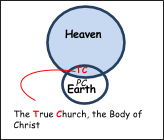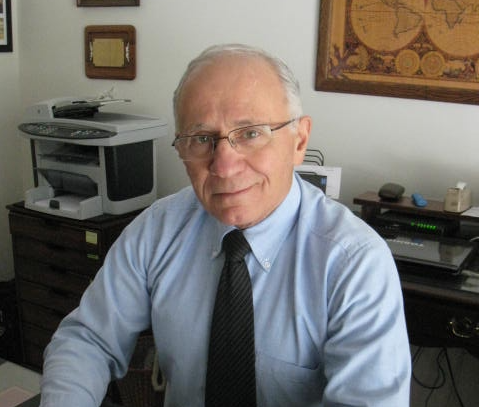- CALLED Part 2. Understanding “Perfection” (Completion/wholeness/Maturity)
THE CALLING Each man is unique and will forever have his or her individual identity. At the same time, however, each man is incomplete in spiritual development. Because one appears mature naturally, maybe being well educated, and morally upright, it does not necessarily translate to being spiritually mature. As a matter of fact, all these natural assets alone may prove detrimental to his spiritual development as his confidence and reliance are more apt to lie in his natural abilities rather than in the work of God. Christ is more than our example, one to emulate. There is a deeper work of the Spirit: “for it is God who works in you both to do and to will of His good pleasure.” (Phil. 2:13) .
So, this initial calling is for the individual for spiritual maturity befitting that of a member of the Kingdom of God–remembering that “our citizenship is in heaven,” (Phil.3:20) and, “that you should have a walk worthy of God who calls you into His own kingdom and glory.” (1 Thes. 2:12) In place of the expression “spiritual maturity, tHihe Bible frequently use the term perfection or complete. Thus the term perfection does not imply flawless or pure. Rather it speaks of a process of becoming mature, of age, of wholeness or completion. Perfection is a goal rather than a state. It is as a child becoming an adult not only physically in appearance but emotionally and character. An adult acts, behaves, and functions differently than a child.
Biblical Explanation of Perfection.
Continuing on with this teaching will require an in depth look into scriptures. Sometimes a teaching will take the form of a synthesis, in which several (sometimes many) scriptures are brought together like pieces to a puzzle. Eventually the entire picture is seen as a whole. Other times, the individual pieces (scriptures) of that puzzle must be analyzed in detail to make sure that piece really fits where it is supposed to go. Such will be this study on perfection. To the Thessalonians Paul wrote:
“For this reason we also constantly thank God that when you received the word of God which you heard from us, you accepted it not as the word of men, but for what it really is, the word of God, which also performs its work in you who believe.” 1 Thes. 2.13
If it is really the “Word of God,” would not one want to know exactly what God is saying? We will do our best to provide explanations while maintaining the integrity of the Word.
A key scriptural passage to understanding perfection is Ephesians 4:11-16. It is a central piece to this puzzle.
| 11”And He gave some as apostles, and some as prophets, and some as evangelists, and some as pastors and teachers, 12for the equipping of the saints for the work of service, to the building up of the body of Christ; 13until we all attain to the unity of the faith, and of the knowledge of the Son of God, to a mature man, to the measure of the stature which belongs to the fullness of Christ. 14As a result, we are no longer to be children, tossed here and there by waves and carried about by every wind of doctrine, by the trickery of men, by craftiness in deceitful scheming; 15but speaking the truth in love, we are to grow up in all aspects into Him who is the head, even Christ, 16from whom the whole body, being fitted and held together by what every joint supplies, according to the proper working of each individual part, causes the growth of the body for the building up of itself in love.” Eph. 4:11-16 |
Comments on verses.
- 11. The ministry of apostles, prophets, evangelists, pastors and teachers is frequently referred to as the “Five-Fold Ministry.” The Church is not limited to these five ministries, but they represent the spiritual foundation ministries for the Church. Obviously, the Church needs more than a pastor to oversee it, establish, protect, strengthen, and bring it, and its members, unto full stature. I believe there is a need in today’s Church to recognize and be open and receptive to these divinely appointed ministries set in place by Christ.
- The term equipping is also translated elsewhere as perfecting, meaning “preparing to become fit.” It takes multiple workings by multiple ministries to properly equip the Church. An isolated church without interaction with the ministries of the Body of Christ is very limited in its ability to equip its members. When considering the phrase building up the Body, I think of an analogy in the natural of a local barn-raising. I happen to live in Amish country and have watched as the men and women of the Amish community gather together in force to erect a new barn. With all the materials and tools at hand, they work together, every one doing his or her particular part, as the barn is quickly erected. This analogy must be translated into the spiritual and for the building up of the Body of Christ.
- Until we all attain speaks of a goal, and end product. One can only attain something they are pressing towards. Such a goal should always be before the believer. When one loses track of the goal or vision, he quickly loses direction and wanders about, maybe doing many good things, but not progressing in spiritual stature. Unity or oneness, must be thought of as something living, an organism, rather than an organization with members having something in common. Each person’s body is one and all parts function together, under the direction of the head, to bring well-being to the whole. Trouble occurs when its parts are not in unity but begin to function independently. In this case, one’s whole being may suffer: body, soul and spirit.
Of the knowledge of the Son is most important to understand. Sometimes we know things intuitively or by just perceiving the outward and obvious. However, this word in the Greek means to know by experience. It actually means to “know in fullness.” One may know of Jesus, His life and crucifixion. To experience Christ however, is to know Him as the One you have been drawn into close relationship with. One who dwells within the heart. It is spiritual fellowship.
To a perfect man, is the focus and the goal. Perfect does not mean flawless or absolutely pure. It refers to a condition of maturity, even as a fruit ripens to a point or readiness. One’s relationship with a mature individual is quite different than with one that is imperfect, or immature. One cannot entrust an immature individual with great responsibilities. They can only receive nurturing. So too is the relationship of Christ with His Church and individual believers in particular. This relates to the measure of the stature which speaks of the end stage of maturity, a fullness of Christ. Thus is the Word of God for us–His high calling upon our lives.
- We are no longer children speaks directly to the problem of immaturity. The Bible recognizes two stages of growth: the immature child and the son who has become of age. The believer is born into the family of God as a child. A child is subject to deception, instability, being without focus, and is irresponsible. A mature son, however, is stable in character and understanding and may take on greater responsibilities in his father’s business, even as Christ did of His Father. Paul said to the Corinthians, “I gave you milk and not meat, because you were, then, unable take it, and even now you are not able;”… (1 Cor. 3:2) Without further elaboration on this point, please refer to 1 Corinthians 11: 1-4 and Acts 20: 29-32 for a further word on this grievous concern of immaturity and stability for the local church.
- To speak the truth in love is to speak reality with regards to spiritual matters, and not natural matters. Jesus said to Pilate, “You say correctly that I am a king. For this I have been born, and for this I have come into the world, to testify to the truth.” (Jn. 18:37) He had only in mind spiritual truths, which are heavenly, invisible, and intangible but none-the-less part of our reality. Pilate and the world could never perceive the truth or reality of the new birth in Christ. The seed of Christ in the believer is real, but invisible and intangible. Other truths such as the Church being the dwelling place of God in the Spirit (Eph. 2:22), or the believer being translated into the kingdom of God (Col. 1:13) are spiritual reality to be experienced—yet beyond the perception of the world.
To grow up in all aspect demands a positive change, a maturity in the believer’s entire person: body, soul, and spirit. Paul said, “When I was a child, I used to speak like a child, think like a child, reason like a child; when I became a man, I did away with childish things.” (1 Cor 13.11) This thought must be applied to our spiritual condition such as the church gathering becoming a functioning of the Body of Christ and not just a gathering of its members as a forum for worship and to hear a sermon. It means to become sober about one’s spiritual life and the putting away old passions and behaviors.
- “…the whole body, being fitted and held together.” Why don’t our bodies, composed of flesh, organs, fluids, and bone simply fall apart? What is holding us together? Is it not some kind of invisible molecular bonding or some God ordained physical force(s) that holds matter together? But what about the spiritual—the Church, the Body of Christ? Colossians 1:17 reads, “And He (Christ) is before all things, and in Him all things consist (held together).” The Spirit of Christ is the ever present force that bonds together each and every member of His Body. It is not of the natural, such as taking an oath or pledge, or having a common goal. His permeating and saturating presence is divinely ordained as the force that holds us together as a Church.
The phrases, every joint supplies, proper working of each individual part, and causes the growth of the body deserve not only our attention, but our response to this final exhortation. Every joint, each part, properly working together contributes to the growth of the Body, the Church. Such growth cannot happen as an individual, or without proper response of every member to his or her calling to function in the Body. (This will be elaborated upon in the following Part 3. Understanding Appointment (Ministry).
Character Matters
This Ephesian passage addresses the need for spiritual maturity for both the individual believer as well as for the corporate church. Perhaps the greatest key to this maturity is character development. We can easily be fooled by one’s personality, which is something that is outward and apparent. One can be outgoing, friendly, and likeable. It is like some of the old houses in my town. They may have an outward façade of some kind of new exterior siding. However, beneath that attractive exterior is an old log house having many problems relating to old houses. Thus, it may be after a long period of time that we begin to discover what lies beneath that individual with such an endearing personality. We may see disturbing character traits begin to surface such as being controlling, or seeking power and influence, or manipulating and deceptive.
Thus, character is an inward enduring trait of a person. It represents his or her true nature. But what we want to address here is a measure of spiritual truth regarding godly character. What we find is it is not in the ability of the individual to change, but that it requires a divine miracle working in one’s life. One of scripture’s most powerful verses on godly character is:
“According as His divine power hath given unto us all things that pertain unto life and godliness, through the knowledge of Him that hath called us to glory and virtue: Whereby are given unto us exceeding great and precious promises: that by these ye might be partakers of the divine nature, having escaped the corruption that is in the world through lust.” (2 Pet. 1:3,4)
It is simply overwhelming to personally receive this verse as the Word of God by faith—and, it requires much faith to agree with and receive the promises of this scripture. Imagine this, with all of your mind and heart that the power of the living God, our Father, is working in us so we may be partakers of the divine nature. This is the revelation of, “the glorious riches of this mystery, which is Christ in you, the hope of glory.” (Col. 1:27) That little word hope, which does not mean “wish for” but actually means to “fully expect” completes that work of faith. This is the essence of the vine and the branches spoken by Jesus (Jn. 15:1-8). It is the flow of His intrinsic nature (the vine) into the believer (the branch).
There is a scripture in Philippians that needs explanation for it is frequently misunderstood.
“Wherefore, my beloved, as ye have always obeyed, not as in my presence only, but now much more in my absence, work out your own salvation with fear and trembling. For it is God who works in you both to will and to do of His good pleasure.” (Phil. 2: 12,13)
Please understand, it is not working for your salvation. That aspect of salvation was eternally received in the new birth at which time the believer became a child of God. Now, there is a working out of the salvation of the soul which involves your very inward nature, character. This is further being partakers of the divine nature. And, what is of this nature? What is its essence? Perhaps no greater explanation of this nature may be found than of the fruit of the Spirit:
“But the fruit of the Spirit is love, joy, peace, forbearance, kindness, goodness, faithfulness, gentleness and self-control. “ (Gal. 5:22,23)
Space does not permit going into much detail here but a few comments must be made. These nine fruit will completely change one’s life and add health to one’s body, soul, and spirit. These are spiritual, not natural. Take the first three for example, love, joy, and peace. These are divine attributes, thus meaning they are constants, unfading or diminishing. In the natural these “feelings” are variable and inconsistent. Each waxes and wanes over time. Man may love another one day, is neutral towards him the next day, and despise the person on another day. Joy and peace may flood our being in one instant and be diminished in a short time, maybe even replaced with sadness or stress. But the fruit of the Spirit are not controlled by situations and time. They are of God. O’ how the remaining six fruit not just express themselves in Godly character but minister to our own souls as well. And for me, to have self-control in all matters in my life would mean so much. Much needed is to have this “internal regulator” that controls my outward behavior, to keep me temperate and well-balanced in thought, heart and deed.
An Example of Character in the Church
I have been blessed for many years now to be surrounded by such quality people in my fellowship. Following are some reflections I have on their character, individually, and corporately as a whole. This list, of course, is not exhaustive of character traits, but only those that have come to mind immediately. These, my brothers and sisters in Christ, have:
INTEGRITY – moral uprightness, ethical, honest, and trustworthy; truthful, without deception; no double-standards; are not “open” for the sake of “unity,” but in all things test doctrine and others by the Word of God.
FAITHFULNESS – steadfast and loyalty; strongly bonded in the Spirit; having a sense of kinsmanship not membership; standing the test of time.
TRUSTWORTHINESS – reliable, dependable (confident); devoted to their calling in Christ; functioning as integral part of Body; not self-promoting; doing all to best of their ability in Christ; not slothful
HUMILITY – not full of self-importance; not controlling; not exalting self over others; know full well the meaning of grace and mercy; submissive; gentle.
SELF-CONTROL – “Goodly measure of”! Temperate, well-balanced; living in God’s defined balance; in world not of world.
There is a second aspect to our calling unto maturity, unto full stature. It is a corporate call for maturity for the corporate Church to truly function as the Body of Christ. We will give ourselves to this teaching in the following Part 3. Understanding Appointment.
Ch. 3. The Master Plan: From the Cross to the Eternal Purpose, continued.
- CALLED Part 3. Understanding “Appointment” (Ministry)
THE CALLING—Becoming more specific…the Church, the Body of Christ.The Kingdom of God is not shut up to man, nor is access to it by Spirit invitation only. In Jesus’ dialogue with Nicodemus of John 3, in order to be perfectly clear about this, Jesus repeats Himself and says twice, “…that whosoever (all, every) believes in Him should not perish but have eternal life” in verses 15 and 16. It is emphatic. However, when it comes to matters of the government and functioning of His Body, the Church, it does not come down to man’s choice and preferences, but by appointment and decree only by Christ, the Head. Perhaps the most profound difference between a “ministry of vocation” and one of “divine appointment” is that the former touches the senses of the natural man such as his emotions, new knowledge, and desires, and there is a temporal response. While the latter touches the inward man apprehending his heart, brings revelation of mysteries, and a measure of impartation of light and life, and his life is forever altered.
Watchman Nee wrote the only “True Church” is that which comes out of Christ, as Eve came out of the side of Adam, so too the Church comes out of Christ. See “TC” in the following diagram. There is “another” church in the earth, after the similitude of the True Church but is of all the abilities, strengths, and resources of man. It is a Pseudo-Church. See “PC” in the diagram. This church looks like the real thing, is patterned after the real Church, uses much of the same doctrine and terminology of the True Church, but whose head is actually man in all his sophistication, and not Christ. Here man chooses his ministry, is educated by institutions certified by man, has all the titles of bishop, reverend, priest, elder, deacon, etc. associated with church government, and is well accepted by society. However, with man as the head, the Spirit of God may be lifted from the church, His glory departed, yet the church continues to function in His absence, as it has done in many places for many years. It becomes a religiously functioning organization quite capable of continuing independently of the Spirit and is cunningly deceptive. I beg your tolerance if this seems exceeding hash and judgmental, but like so many of my associates in Christ, I too had been a member of this pseudo-church for many years and know quite well its ineffectiveness in producing anything truly life-giving of the Spirit and of the kingdom of God. It is only a façade, a pretty outward covering, temporarily pacifying the conscience of man.
Rather, in the True Church, all its various ministries and functions are called and appointed by Christ as the Head—

The purpose of the Church is unwavering—“To perfect (bring to completion), establish, strengthen, and settle,” every man according to the workings of the Holy Spirit. (See 1 Pet. 5:10) Its profit is not in any outward measure of size, number, wealth, list of accomplishments, or any such thing. As Jesus has said, “I have come that you may have life and that you may have it more abundantly,” and this life of which He speaks is something that is living and is alive within, springing up as a fountain of living water. It is a new life in union with Christ and His Body of believers. One-is-never-the-same-again!
When such believers assemble as the Church, the Body of Christ, it is quite special: God has gathered His family about Him, Christ is at its head, and it becomes a holy habitation of God in the Spirit. Something wonderfully and imaginably beyond so much that we see today. But let us be convinced otherwise. There is very much to be written on this matter, but we are limited now by space. Much will, however, be revealed in the forthcoming chapters of this book. It would be a disservice to end this chapter in any other way then to cite Eph. 4:11-16:
| 11And He gave some as apostles, and some as prophets, and some as evangelists, and some as pastors and teachers, 12for the equipping of the saints for the work of service, to the building up of the body of Christ; 13until we all attain to the unity of the faith, and of the knowledge of the Son of God, to a mature man, to the measure of the stature which belongs to the fullness of Christ.14As a result, we are no longer to be children, tossed here and there by waves and carried about by every wind of doctrine, by the trickery of men, by craftiness in deceitful scheming; 15but speaking the truth in love, we are to grow up in all aspects into Him who is the head, even Christ, 16from whom the whole body, being fitted and held together by what every joint supplies, according to the proper working of each individual part, causes the growth of the body for the building up of itself in love. (New American Standard Bible) |
- “But now God has set the members, each one of them, in the body just as He pleased.” (1 Cor. 12:18)
- And again, “And God has appointed (set) these in the church: first apostles, second prophets, third teachers, after that workers of miracles, then gifts of healings, helps, administrations governments), variety of tongues.” (1Cor. 12:28)
- And again, “And He Himself (Christ) gave (to the church) some to be apostles, some prophets, some evangelists, and some pastors and teachers…” (Eph. 4:11)
- Yet again, a charge made to the elders at Ephesus, “Therefore take heed to yourselves and to all the flock, among which the Holy Spirit has made you overseers, to shepherd the church which He purchased with His own blood.” (Acts 20:28)
- Finally, an encouragement by Paul to Timothy, “Therefore I remind you to stir up the gift (of evangelist, see 2 Tim. 4:5) that is in you through the laying on of my hands.” (2 Tim. 1:6)



